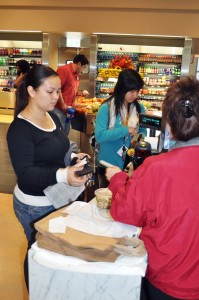Students say new market is too expensive
Some students say the prices at Seeds Marketplace in the Ronald Tutor Campus Center are too high, but USC Hospitality officials say the prices reflect the costs of a small-scale store.

Cashing out · Christine Tanguay, a junior majoring in architecture, makes a purchase at Seeds Marketplace in the Ronald Tutor Campus Center. - Mindy Curtis | Daily Trojan
Seeds, new to campus, is both an eatery with made-to-order items such as sandwiches and salads and a miniature convenience store that sells grocery items, such as cereal, cookies and drinks.
Students said item prices are inflated; for example, a container of Chef Boyardee is sold for $2.49 — compared to a larger container for $1.69 at Vons — and a container of Campbell’s Soup sells for $4.99, compared to $1.89 at Vons.
Even though Seeds has become a popular spot for meals and a convenient source for groceries, some students said the prices make them less enthusiastic about the new store.
“It’s because it’s USC. Everything is a little more expensive or much more expensive, but we don’t have any other place to get it, so do we have a choice?” said Ahra Roh, a graduate student studying occupational therapy.
Likewise, Madeline Lansky, a sophomore majoring in political science, said Seeds is pricey but that high food costs are common on USC’s campus.
“I consider the food to be pretty expensive, but it’s pretty in line with how everything is priced on campus,” she said. “To be honest, most of us don’t even think about it. But when I take a step back and look at it, it’s pretty expensive for what you’re getting.”
On the other hand, some students said they consider Seeds to be adequately priced for its convenience and quality.
“[The prices are] moderate. The sandwiches might be a little small for their cost but they’re really good so I find that acceptable,” said Jared Sokol, a freshman majoring in biochemistry.
In response to those who might ask for lower prices, Sokol defended quality over quantity.
“It’s high quality products. I don’t think [students] really realize that. And that translates into more expensive prices,” Sokol said.
Kris Klinger, director of USC Hospitality, said he admits that some items are priced higher than neighboring grocery stores.
“That’s because they buy hundreds of cases and we may just buy one,” he said. “They’re not easy to get if you’re not a large grocery store and don’t have the volume that a Ralphs or a Vons has so it was a little more expensive for us to get.”
Although there is a difference in pricing, the convenience of a grocery store on campus makes providing the products — even at a higher price — worthwhile, Klinger said.
“[Seeds] was a concept that we created because we thought it matched what the students were looking for,” he said. “We did a lot of surveys and asked students what they did enjoy and that’s what we came up with.”
As far as made-to-order items, Klinger said USC Hospitality priced the items based on competition and market values.
“We went around and looked at what others charged for similar or like sandwiches,” Klinger said. “We came up with what we believed [were] very fair prices based on what we’re charged.”
Both Roh and Lansky agreed that not knowing what goes into pricing make the costs seem artificially high.
“I just wonder how the price system goes. I want to know why it’s a little bit more expensive,” Roh said. “If we know the reason, it would be a little better.”
Although lower prices would be ideal, Lansky admitted that bringing costs down isn’t just a matter of changing price labels.
“I think they should lower the prices but considering the campus center was just built and I don’t really know what goes into setting prices, I doubt they’re just making it expensive for the sake of making it expensive,” she said.
Klinger said he is open to suggestions on how to lower prices, such as finding cheaper alternative grocery items, based on student demand.
“If it’s a made-to-order item we could get creative and possibly bring in a lower quality of meat or bread for instance, but we really didn’t want to skimp on quality,” he said.
In addition to maintaining quality of food, profits also contribute to the university and ultimately to students, he said.
“[USC Hospitality is] a revenue-generating entity but we run a zero-based budget, which means that the money that we do make goes right back into the university and its programs,” Klinger said. “If we do make any profit, it goes into funding of future growth of the department of auxiliaries or other departments throughout the university.”

I just wish Hospitality would be consistent in posting prices. Half the time, I pick up a product, and there’s no indication of the price. Given how different prices are from those in off-campus stores, I’m not about to guess. I end up not buying anything at all because I don’t want a nasty surprise at the register.
As for options, we have Superior, Ralphs and Smart & Final to buy groceries. They’re not Trader Joes, but it’s not the monopoly the article makes it out to be. And why are prices compared to Vons’ prices? Where is the nearest Vons?